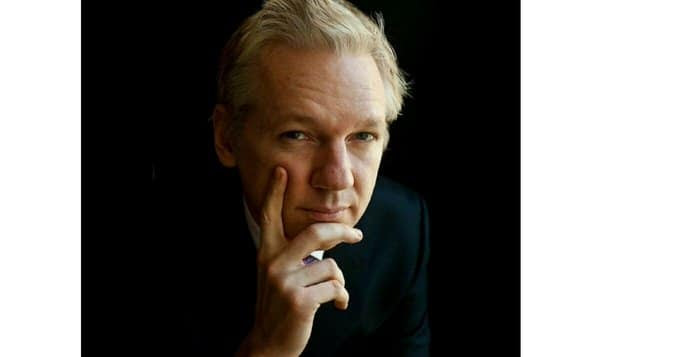
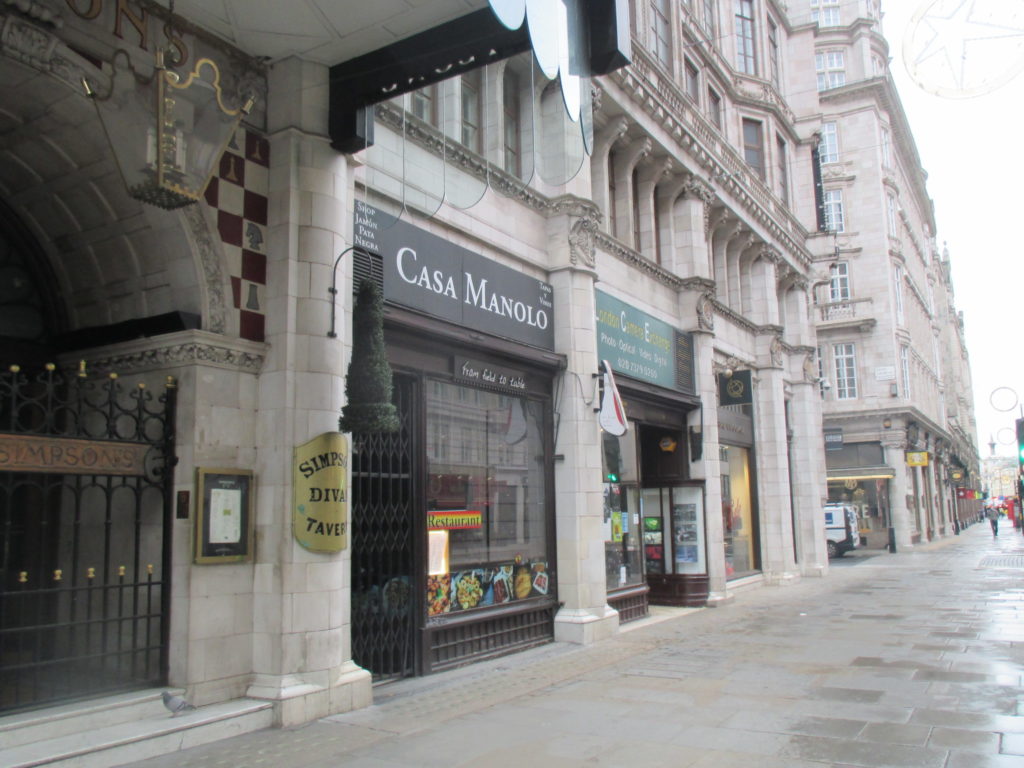
Centre of London deserted and closed
Monika Karbowska
On the evening of the 4th January I am still looking for food in a deserted City. Only a Japanese restaurant sells take-away food under threatening posters(« don’t touch this! Don’t touch that! Don’t go into the shop if you have covid symptoms! Disinfect your hands! « ) I can’t wait to move to a friendlier neighbourhood. In the morning when I leave the hotel the feeling of desolation is even stronger. Not only are the offices, hotels and flats for rent are empty, but the shops are closed, forbidden to work or outright bankrupt. I stop in front of two small shopkeepers who will soon reach the cemetery of Covidian capitalism: a law bookshop opposite the Royal Courts of Justice (Court of Appeal) and a men’s clothing shop. It’s a pity because the bookshop has a book in its window that would have interested me: its title is « fake justice, fake law ». There are surely elements in it to understand how a fake trial can be held in a real court with a fake prisoner but real jailers and guards. The clothes shop moves me even more with its beautiful British tweed jackets and eccentric colourful socks – 70% off, it’s an atmosphere of definitive end[1].
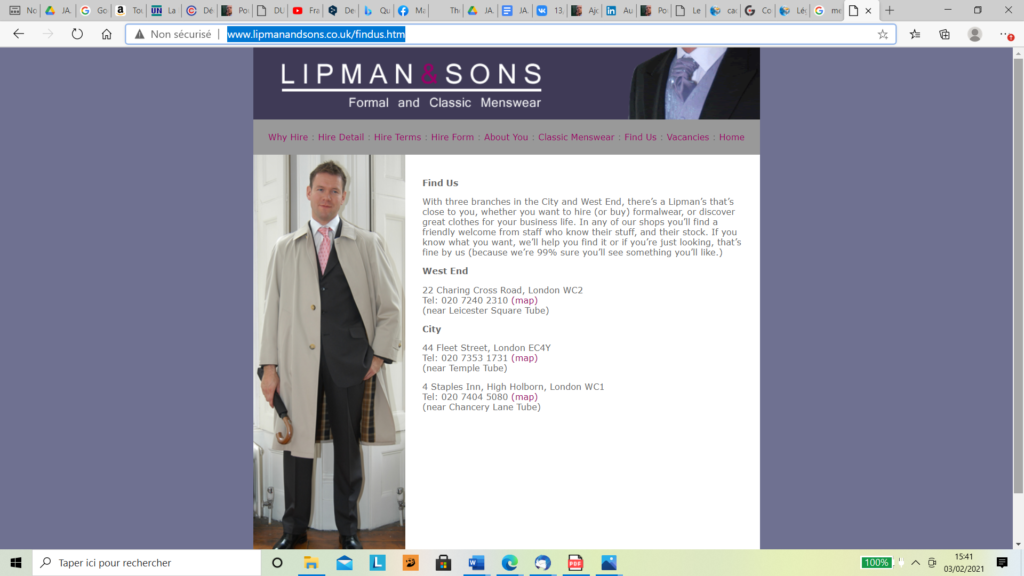
In front of the yellow, purple, red and orange colours of the socks I remember the ones we sent to Julian Assange in two parcels in September 2019 when we were trying to get in touch with him and thought it would be feasible to visit him. The Belmarsh Visitor Center staff had advised us to send him a package and as the only package allowed to prisoners past 28 days was underwear and socks, we chose beautiful socks in the most flamboyant colours. « He seems to like socks » – we thought to ourselves as we thought of those curious pictures of Julian Assange in socks staged by the media. Belmarsh Prison never received the package, which remained in the mysterious vaults of the Royal Post Office, which also never returned the package to us undelivered. This is how we had the first serious doubts about Julian Assange’s presence at Belmarsh, because all prisoners, even the most heavily convicted, can receive letters, parcels, visits, mail and money there.
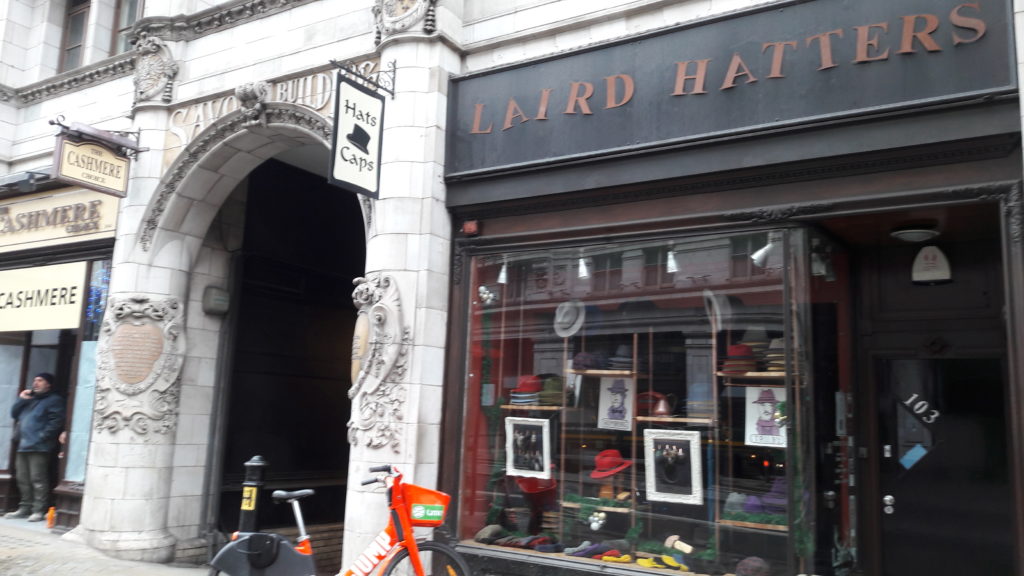
The City is a ghost town but when I go beyond the boundary of Westminster the situation is not much better. On the main shopping street Strand Street from the High Commission of Australia to Charing Cross tube station near Trafalgar Square is the berezina: all the shops are closed and nearly a third of them are already for sale. The lockdown, locking, closing, is here as in France a gigantic operation of artificial destruction of capitalist value, an auto-da-fé from which a brand new capitalism will emerge, over-powerful world oligopolies will be born on the ruins of the old world. But as my Polish anti-Covidian friend Jacek Nowakowski has said from the beginning: capitalism does not participate in a contest of who is the most effective in saving humanity. Capitalism destroys humanity for the benefit of a handful of powerful people, it is destruction even as it so well shows in the 20th century. Whoever does not see that the covid is an operation of destruction, a merciless economic war on the backs of the people must imperatively stop believing that he is doing politics and go back to cultivating his garden.
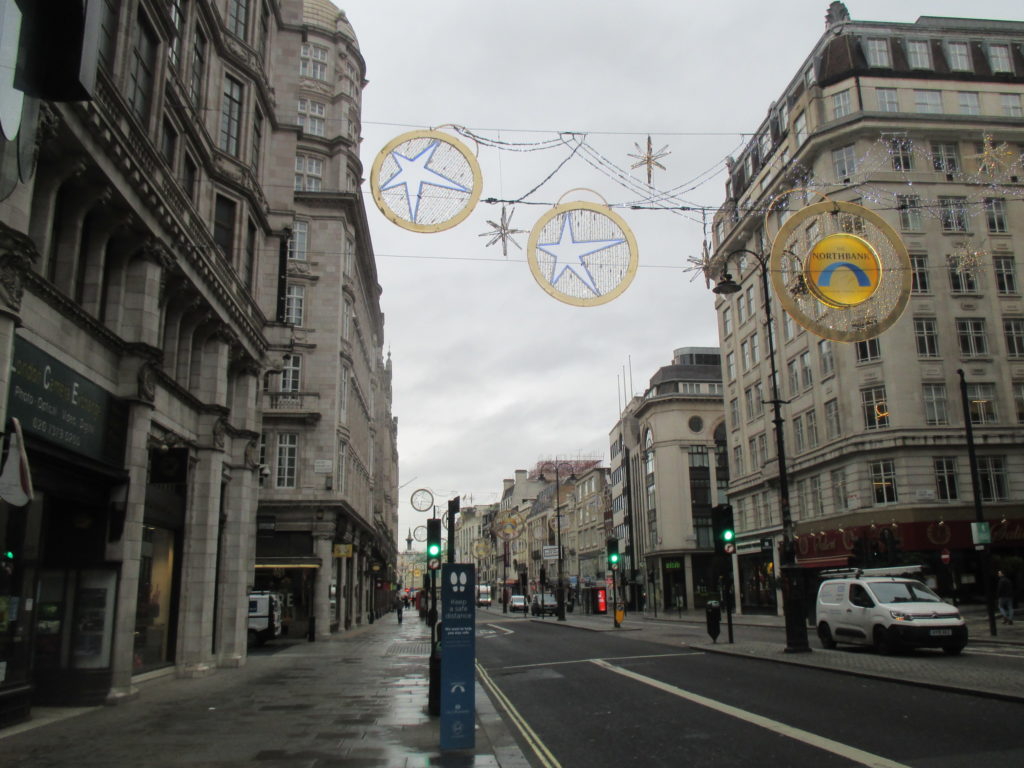
Tomorrow these shops will no longer exist, but there will be something else, as always, which will satisfy the possessing elite of the moment. As for our lost lives, our culture in tatters, this is not the business of the capitalists, as the thurifers of « creative destruction » paid by the American foundations in Warsaw when they strategically annihilated the structures of Poland Peoples’s Republic, my culture and my social and political base in 1991, explained it to me so glibly. He who is stronger is right, because he is the strongest. This is the evidence.
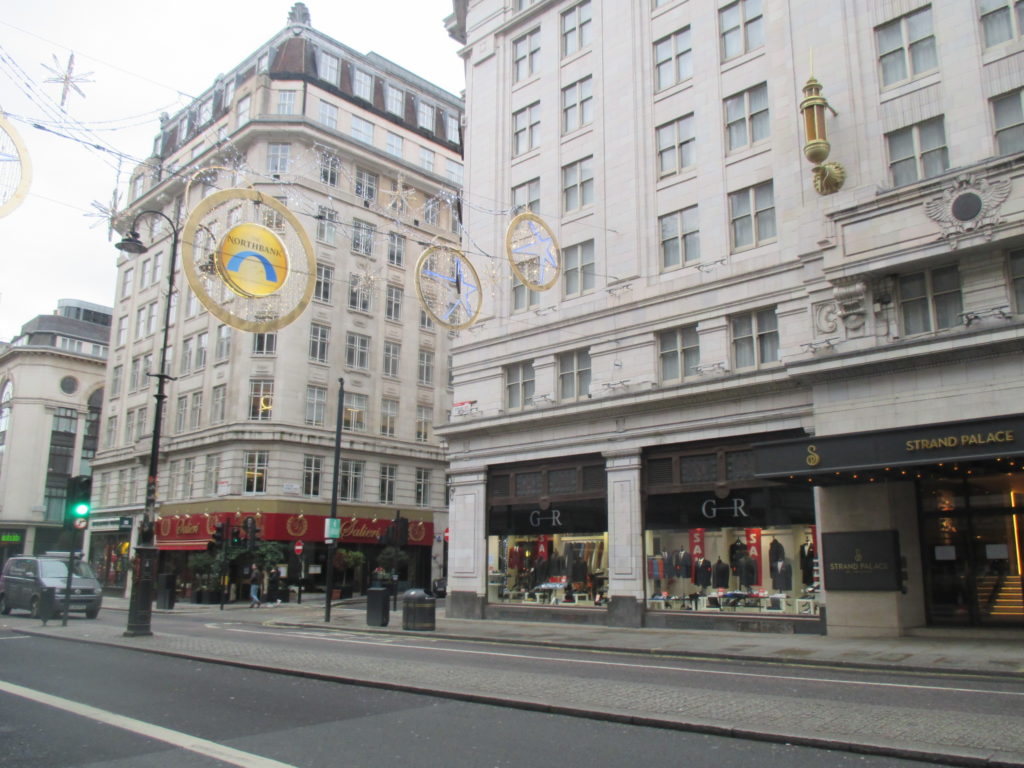
[1]Lipman&Sons, London’s menswear specialists for hire or purchase (lipmanandsons.co.uk
Paddington in the lockdown
I am joining Paddington as soon as possible as there is rumour in the french media that the trial may take place this afternoon in Westminster Court. My hotel is still in the same block close to Norfolk Place and the Frontline Club. The Cypriot owners will be very kind and will make my stay easier without asking for a Covidian certificate. Maybe they are part of the neighbourhood’s resistance against the lockdown. In Paddington many shops are open, even though the restaurants have few customers and take-away sales are restrictive and bring little profit. The Frontline Club with its luxury organic restaurant is closed, but my yugoslavian Fish and Chips and my cosmetics drugstore are working normally. The chichas restaurants and cafés around the Moroccan consulate still gather their clientele even if there is a certain heaviness in the air due to the increasing number of masked walkers, including children. As masks are not obligatory, it is understandable that they are sincerely afraid of the disease.
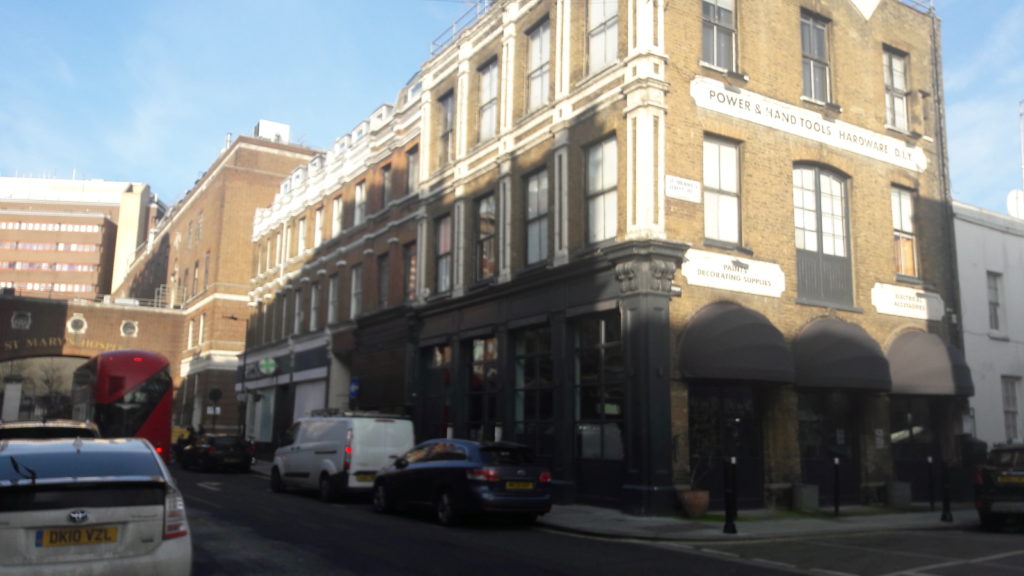
The Westminster Court also works at full capacity as on a normal day. I walk along the former Church Army maternity hospital for poor women, which adjoins the building and shares its basement with the courtyard. Begun in October, the major works have turned into a huge asbestos removal operation and the palisades encroach on the esplanade in front of the entrance to the court offices. I enter the court without any problems and I walk through the corridors inspecting the lists of those on trial. No Julian Assange, but about fifty Eastern Europeans, either extradited or tried for minor offences. They are spread over the 3 floors of the building in rooms 1 to 10. The waiting corridors are filled with men, women and children, there are indeed between 150 and 200 people in the Westminster Magistrate Court building on 5 January 2021 at 2pm. And that will be important the next day.
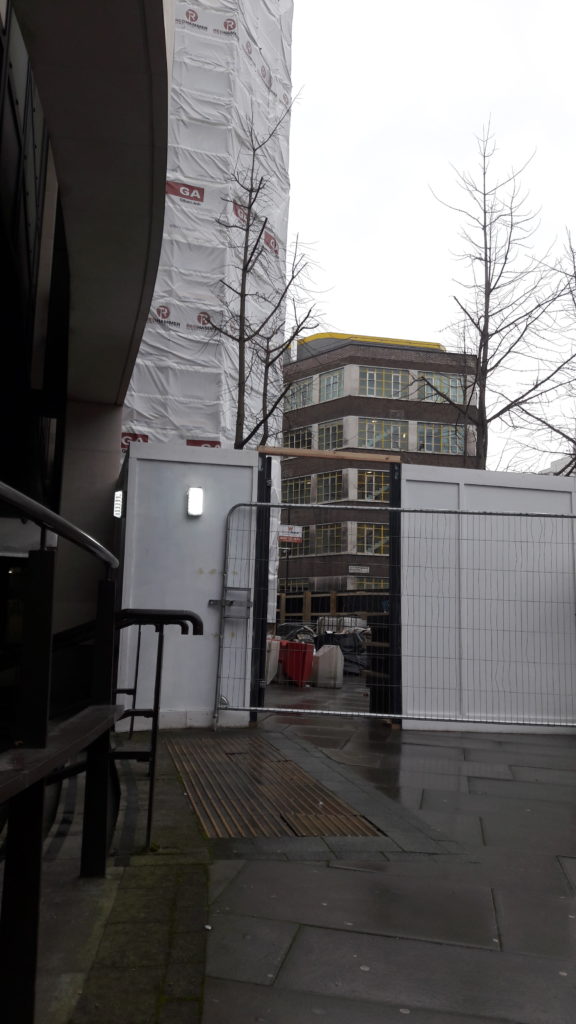
I recognise the faces of some of the prosecutors, solicitors and registrars. One of the public prosecutors who prosecute Eastern European migrants the most is the Public Authority Transport – fines to be paid, perhaps for not wearing a mask. Unfortunately on the second floor I come across one of the black security guards who often works during the « Assange case » and who is more severe than the others. Unfortunatly, she also recognises me and by the look in her eyes I understand that this is not good for me. She will certainly communicate to the authorities that I am already there, the assiduous Franco-Polish woman of the Assange trial. I couldn’t afford to avoid her and with my purple hat and blue coat I am more than recognisable.
I ask the young veiled secretary at the counter if it is indeed Julian Assange’s « application for bail » hearing here tomorrow. She leaves to find out in the office, when normally everything should be written on her computer. Assange is a special case which is obviously not recorded in the registers. She comes out to tell me « yes, it’s tomorrow, 10 o’clock ». I can communicate it to everyone on Facebook, we have to give the most reliable information possible.
I can then go and eat a good meal and chat in the local cafés where I learn a lot. We discuss the situation in our countries, Londoners are concerned about the violence in France. At home the fear is rather economic, because despite the bans imposed by the government, they don’t seem to be afraid of the police, but rather of losing their livelihood, as the neighbourhood was deserted while it lived from tourism. A manager explains to me that the state’s help is limited to paying a few bills, whereas you have to be able to eat and pay the flat’s credit or rent. An owner of a regular café tells me that people are afraid to go to hospital. Indeed, even in an institution as venerable as St Marys Hospital where Fleming discovered penicillin in 1947 and where Diane Spencer’s children and royal grandchildren would have been born, there have been two cases of 60-year-olds who entered for minor ailments, died in the night and immediately stamped « covid deaths » « without the families being able to save their loved one or defend themselves. The same scenario of criminal policy is being implemented everywhere, sowing terror and leading to distrust of the most established health institutions.
To prepare myself for the endurance test of the next day, I buy a nice box of dates and camel milk for breakfast at a nice Moroccan grocery store open late at night.
The ordeal of the battle: storytellers, private militia and various police forces
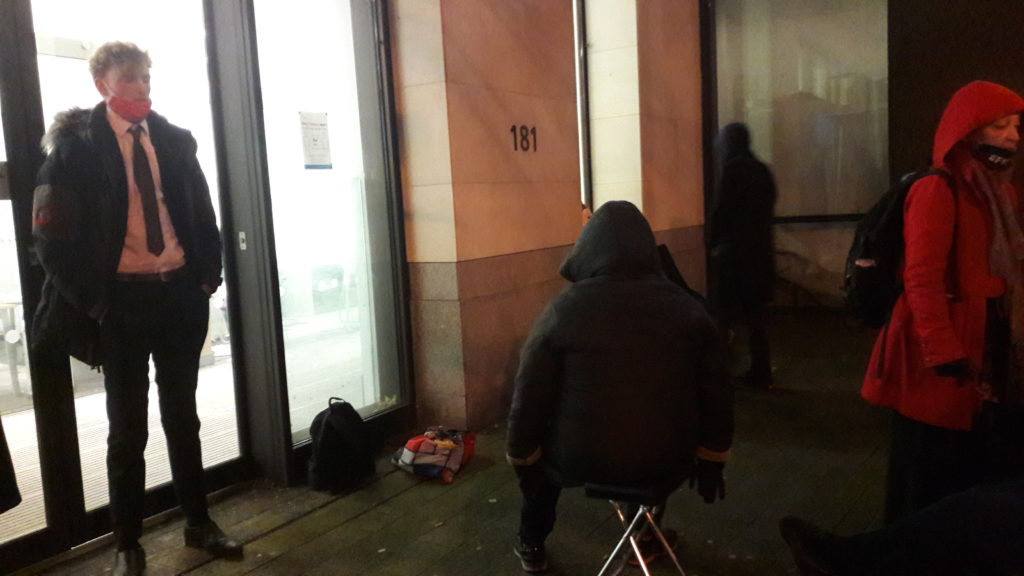
I leave at 5.30 am and arrive in 5 minutes. And I am heartbreaking. At 5.35 am Greekemmy and her friends are already in front of the door sitting on deckchairs and equipped with termos of hot drinks. They may have spent the night there, which I can’t afford for health reasons, it’s far too cold. Nor can I bring camping equipment, as it will be refused in the court while they can leave it with their staff. Moreover, if the police are looking for me I will be wrong as a foreigner. Greekemmy and Deepa sleep wrapped up in their jackets, two young men chatting outside the door with one of their older friends. Behind them Sabine and her son greet me: Arrival at 4 o’clock, everyone was already there, she is a good sixth in line. I had no chance of being first today. But I settle valiantly behind Sabine with my dates and camel milk and my other treasures to share.
I stay up like this from 5.30 to 9.00, three and a half hours. When it rains I open my umbrella, I can’t sit down, I can’t move, I can’t get too close, « social distancing » obliges me. Torture. A blonde girl arrived just after me and rushes in front of the door to chat with the young man closest to the entrance. She looks like one of those journalist « puppies » stipulated by the Center for Investigative Journalism who haunted the Woolwich and Old Bailey trials without understanding anything about Julian Assange’s fate and without really taking an interest in it.
It’s not the legal proceedings she’s discussing with her buddy, it’s more like light flirting. I’m not happy but I can’t do anything about it. I just hope that with 40 seats in room 1 which we know well, even with the most severe Covid we should be able to get 10 to enter… Especially since 2 hours later we are actually only 20 in line for Assange’s trial.
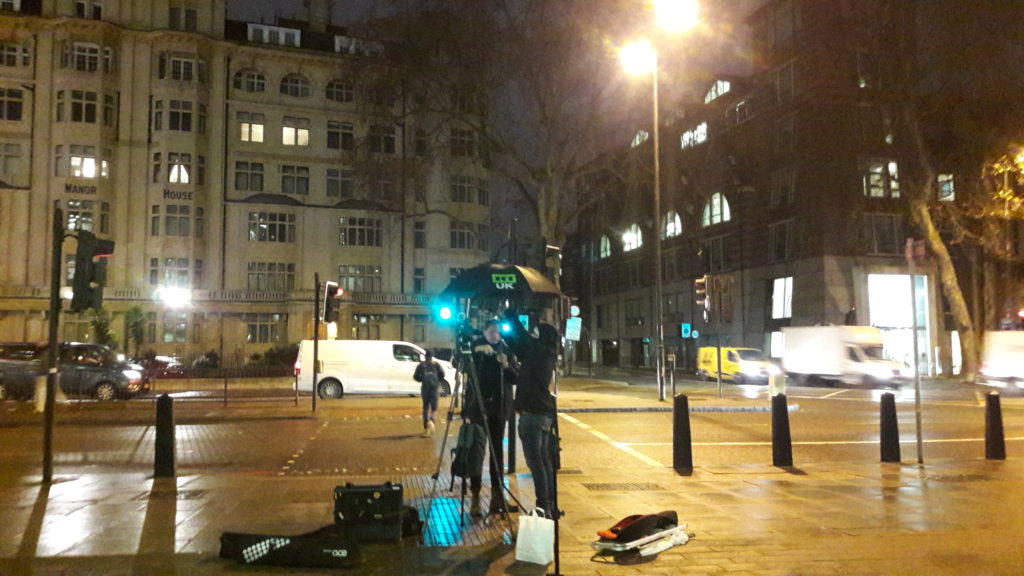
Those who create the crowd on the small square are the 200 journalists and reporters who set up their heavy equipment in front of the door. They even have umbrellas stretched over static cameras mounted on tripods on the pavement. Their lenses are pointed at the entrance as if the journalists are certain that Julian Assange will appear and that they don’t want to miss a second of his precious speech. I tell it to Sabine who confirms that this may be a clue. I notice several Russian channels and agencies, RT of course, but also Ruptly, Rossia Siegodnia 1 and Spoutnik who had contacted us. It’s the first time that there are so many of them, next to the Anglo-Saxon, French, RTL… I suddenly feel full of hope that Julian Assange is free and that I can finally talk to him for the first time. I am ready to communicate with him.
However, our wait is really long as the journalists fill the small square and record everything that happens. The atmosphere changes. It is no longer intimate like when we used to meet only the same people here. We must remember that for 1 year, from September 2019 to August 2020, interest in Julian Assange was at its lowest. When our citizen actions brought him up from the « Dark Place » (as he says in his SOS letter to Wikijustice) and finally won a first battle, suddenly it was the media crowd. Success has a lot of fathers, but they were not very active in the struggle, I’ve been witnessing it here since September 2019! The atmosphere is more like the hypocritical and stifling « rock star welcome » that prevailed in July 2010 when Julian Assange was staged at the Frontline Club for the most important Wikileaks launches.
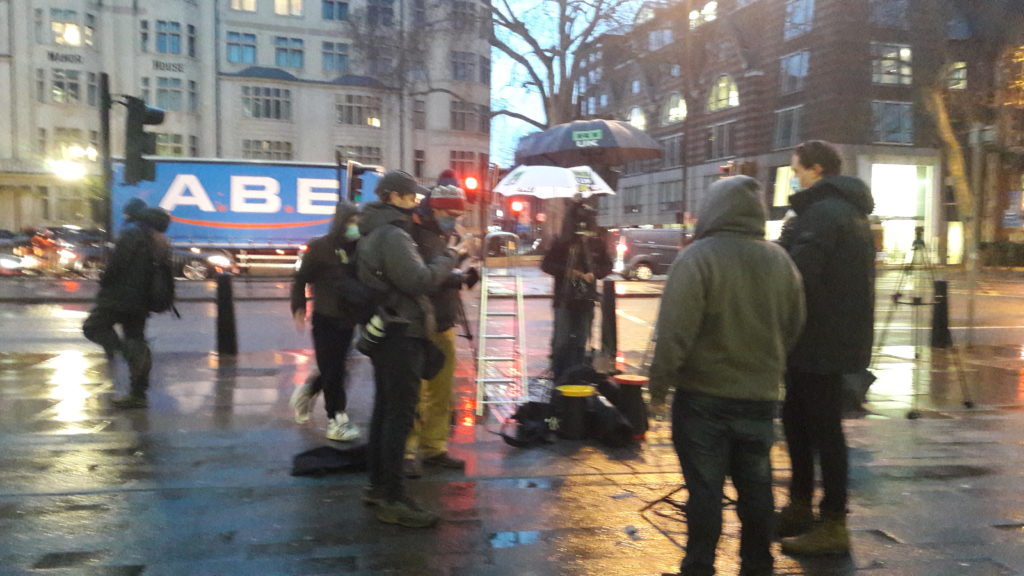
« Sometimes you couldn’t even go through the street, there were so many cameras. And he couldn’t even lean out of the window because he was constantly being chased for a photo. It was like being on a film set, » – an eyewitness living in the neighbourhood told me. Julian Assange, an unknown hacker who suddenly appeared out of nowhere to create a buzz? Rather a personality who was already important in early 2010 for the political-media system as soon as it was launched, just like a fad in the music or film industry.
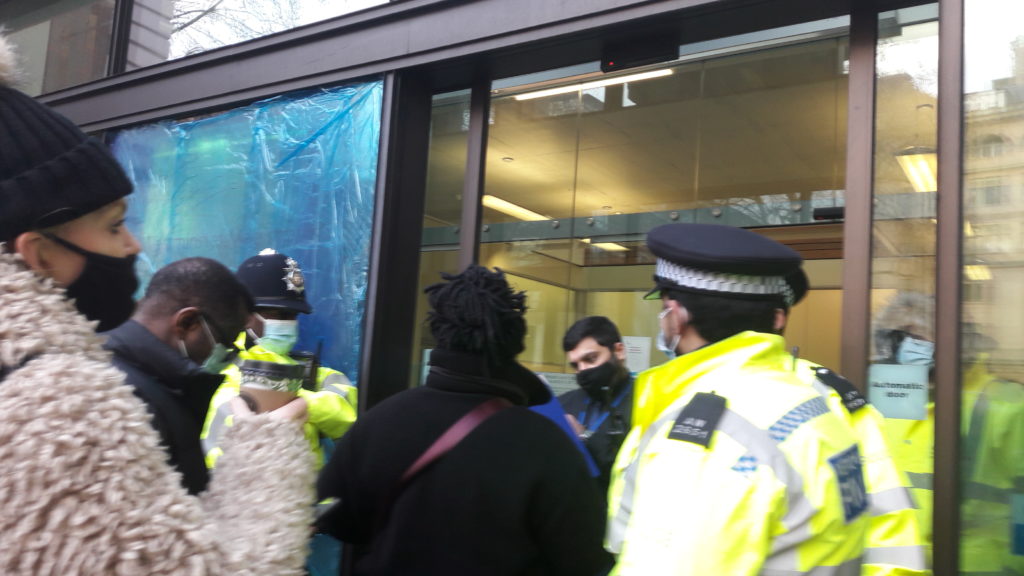
The sun rises around 8.30 am and illuminates a frozen sky. I’m freezing when everything rushes by and I may be unresponsive. Just before 9 o’clock a group of security guards open the front door. They are not the same ones we usually see and they are not the same faces I saw the day before. Of course the company has changed, but some of Mitie’s former employees have been taken over. Today it’s young people dressed in strange, brand new fluorescent jackets like construction workers who take their jobs in the airlock in front of the door that opens. They look very unexperienced for security guards in charge of managing a large flow of people. But then a third character appears who we knew well from 11 October 2019 to 19 February 2020 but whom I hadn’t seen since, during the July, August and October sessions. It was Mitie’s manager who managed the list of Greekemmy in October 2019, who was watching Assange during the hearing of the « Spanish instruction » in room 4 on 20 December 2019. He is also the man that Assange was so visibly afraid of when he appeared in the box on 13 January 2020 and we were able to communicate with him by looking at him. The corpulent Indian man was present in the courtroom in the afternoon and we felt that his presence intimidated Julian Assange.
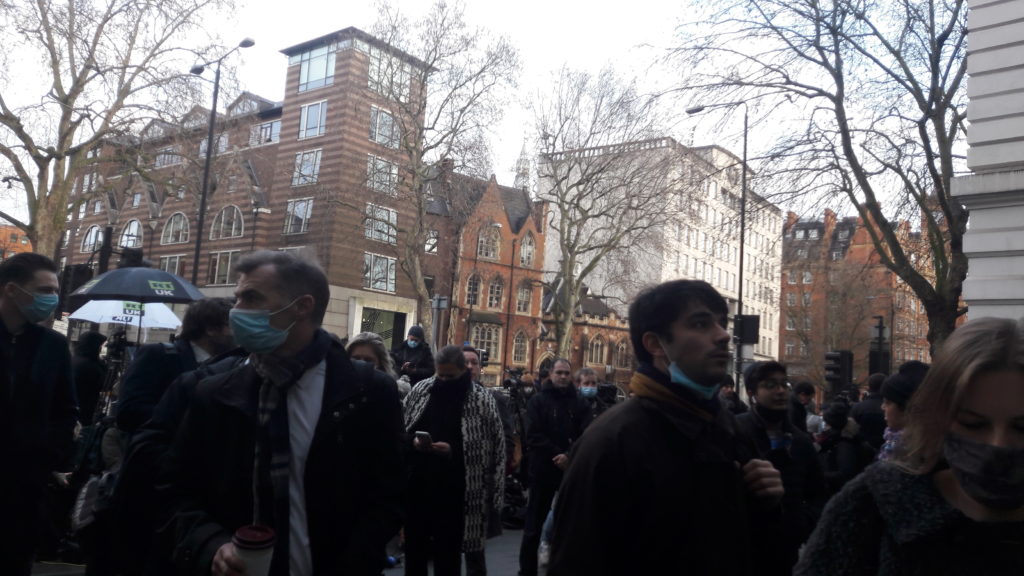
For all these reasons, and also because I have not seen him working outside the Assange trials, I am increasingly convinced that this man does not work for the court but only for the organisers of this « private trial », not really linked to the British Ministry of Justice.
Today our man is wearing a navy blue jumper, a badge on a cord and a black mask. He stands in the doorway as we tighten the queue so as not to lose our seats. Already some voices are asking the blonde girl to move aside as she is only 8th in line after me. She obeyed reluctant. Far behind me I had spotted Georgia. This time she shouldn’t be able to get in as she is in such a bad position. But now I see her greeting me from afar and then… walking up the whole line with the quiet nerve of the one who knows she is right and standing behind me… She makes conversation with me, asks for news and greets Sabine. I expect protests from the others, but no, nobody moves. Once again I have proof that she is part of the trial scenario. She is definitely going to come in.
I am keeping calm while the pressure builds up. The manager says (and it’s always so difficult to understand through the masks) « only 5 people will be able to go home, 8 with the family ». It’s consternation, panic. But there are 40 places in the hall! I’m trying to parley, we’ve already been in Room 1, he knows it, he was there in October 2019 and January 2020! But the man is hard and inflexible « because the Covid ». The Covid serves the interests of the dominant system by preventing citizens from controlling what happens in public places! Why is it impossible today to be more than 4 in this huge empty building, when the day before I saw 200 people at the same time in this same building from 2 to 5 pm! The Covid is mainly used to chase us out of Julian Assange’s trial! Besides, this trial seems to be the only action at the Westminster today, the families of the East European extradited persons are absent and the lawyers of the other cases will be a handful.
Especially as « the family » is not there! We are all Julian Assange’s family! The manager keeps a list with names, someone asks him why he is reserving seats for a family still absent when the court is opening and the journalists are rushing? He answers: « It is the lawyers who give the name of the family ». We have the answer that is the decision-maker for the attribution of the title of « family » to the different activists or employees of the Wikileaks group. However, at this moment neither Fitzgerald nor Summers are present, we continue to protest, in view of the hours spent in front of that damned door.
Previously it had always been possible to enter and the selection was made in front of the courtroom. In the meantime Fidel Narvaez has arrived and without queuing he takes the place of a friend of Greekemmy. The first two young men in front of the door, the one who is a trainee of the CIJ as well as the one who introduced himself to me as an actor, are already entering. Greekemmy embrace Deepa: she is sure that she has definitively pushed me out of the game. The two women enter with Narvaez. The manager then lets a few people through with a small blue press card. Surprise, Georgia has pushed everyone again and she is standing in front of me. I see her showing the man a small white plastic card with two brown stripes. She works well for an important institution, probably a government institution, and this mysterious card is the sesame that opens the doors of this trial for her every time.
So Sabine protests, asserts her status as Julian Assange’s « personal friend ». But to prove this, Fitzgerald must be present. We beg the cerberus to at least let us enter the building to go to the toilets because we are standing here without moving for 4 hours in the freezing cold, a temperature below zero! He refuses « because covid ». In the stress Sabine’s son starts crying and shouting, the crowd of journalists press us, it’s confusion. It is only because of the presence of the child that the cerberus that was so frightening to Assange allows him to go to the toilet. When she comes back, she tells me that she couldn’t get into the room and only saw Assange through the small window in the door.
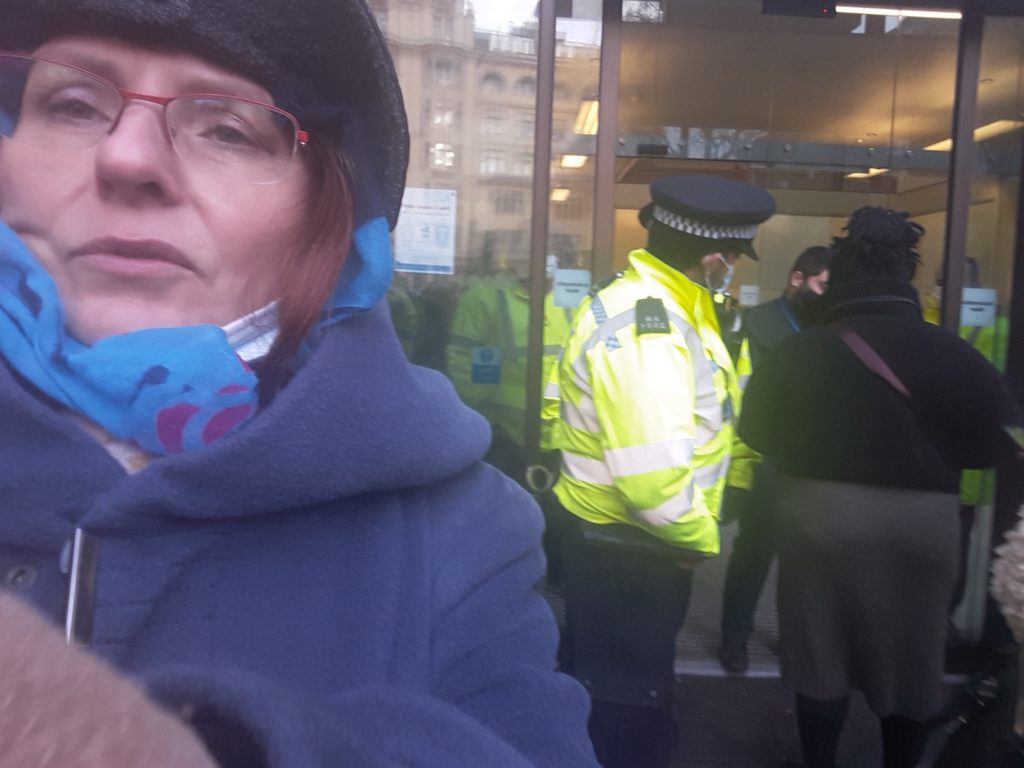
The chief « manager » pushes us back to the right side of the door without mercy, under the pretext of letting the few lawyers from the other trials in. He has only the word « covid » in his mouth, whereas it is all too obvious that he is not acting as a security professional: by pushing back 25 people, he pushs us to the 200 journalists armed with their equipment. We are trapped between him, the wall and the crowd. We are squeezed together as we were at the time of the Woolwich Court trial in February last year. Managing crowds in such an unprofessional way is dangerous. In this type of situation you have to create a flow to avoid blockages and panic. He and the organisers of the meeting are so obsessed with the idea of not letting ANY stranger in the seraglio see Assange (and the negotiators for his release?) that they have decided to disregard the safety instructions and turn us away by blocking us in front of the door even if it means putting people in danger, epidemic or not.
I am very angry and I try to counter-attack: I ask our man his name. He knows he has to answer me, but mumbles an inaudible sound behind his mask. I hear something like « Anish, Anishou » but no last name. I go one step further, tell him I don’t understand and take his badge in my hands to read it. Neither his company name nor his name is on his badge. He only has a simple visitor’s badge. So he does not work for the Westminter Court. It has long been suspected that he is not actually a professional security guard. Who is he and who does he work for then?
The man does not have time to react until the police arrive. It’s the MET, the Metropolitan Police of London, recognisable by the black and white checkerboards on their headgear and their fluorescent chasubles. Usually they are few in number and rather peaceful. We have rarely had to deal with them as they only come to manage the traffic on the street and there hasn’t been a crowd at the Westminster for Assange since at least 21st October 2019! But today 30 people dressed in brand new uniforms arrived, wearing handcuffs, truncheons and black masks. The mask generally has the effect of depersonalizing the relationship and the power of the police is reinforced since we are no longer for them humans with emotions but objects to be managed. Their chief makes « Anushi » open the second entrance door to make the traffic more fluid: the journalists rush in immediately, take photos of the entrance hall, which has the effect of relieving the pressure on us who are stored to the right of the main door. I’m first in line, everyone else presses on my back, including the young freeloader from earlier who feverishly activates her professional camera.
But the policemen form a cordon to protect the front door and push us to the right again. This is not very professional either, as we risk being crushed against the wall. I try to resist the physical and psychological pressure. At first I try to coax the young security guards but they are inexperienced and give me a sign that « it’s not up to us ». When two imposing policemen land between the door and me, I am forced to retreat a little, but I persevere.
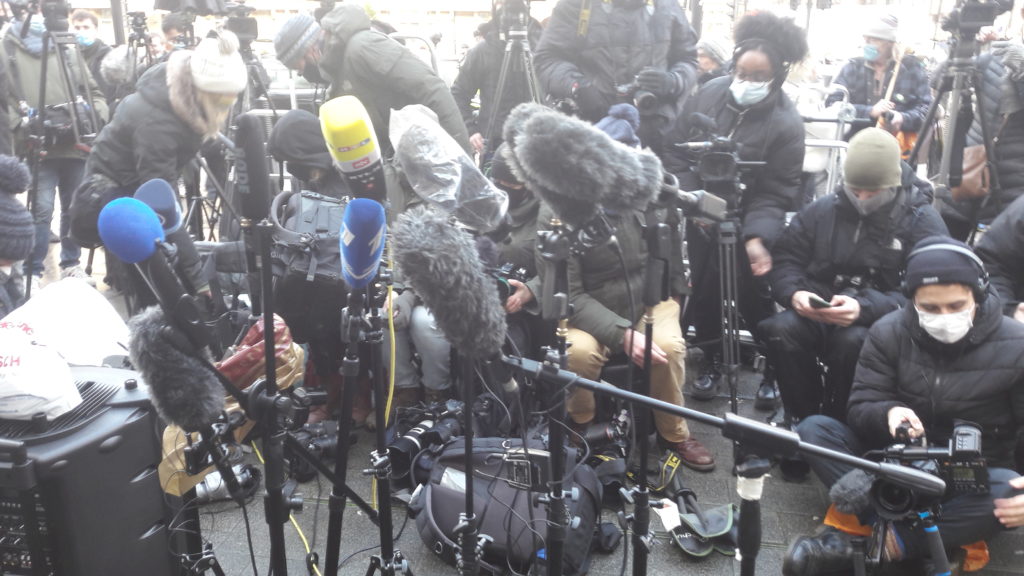
I tell them that I need to go to the toilet, that I’ve been waiting for 4 hours in the cold, but the man sends me back to the Marylebone station. However, he has a friendly voice and I continue the dialogue by softening my tone. I tell him that I represent an association for the defence of human rights and that it is curious that we cannot see Julian Assange to testify about the trial, the state of the political prisoner… The policeman listens to me and says « I understand you ». So, emboldened, I declare that it is not normal that it is not him who keeps order in the court but a private company. He confirms « I am not allowed to enter ». « Because it is a private building, isn’t it? « I continue.
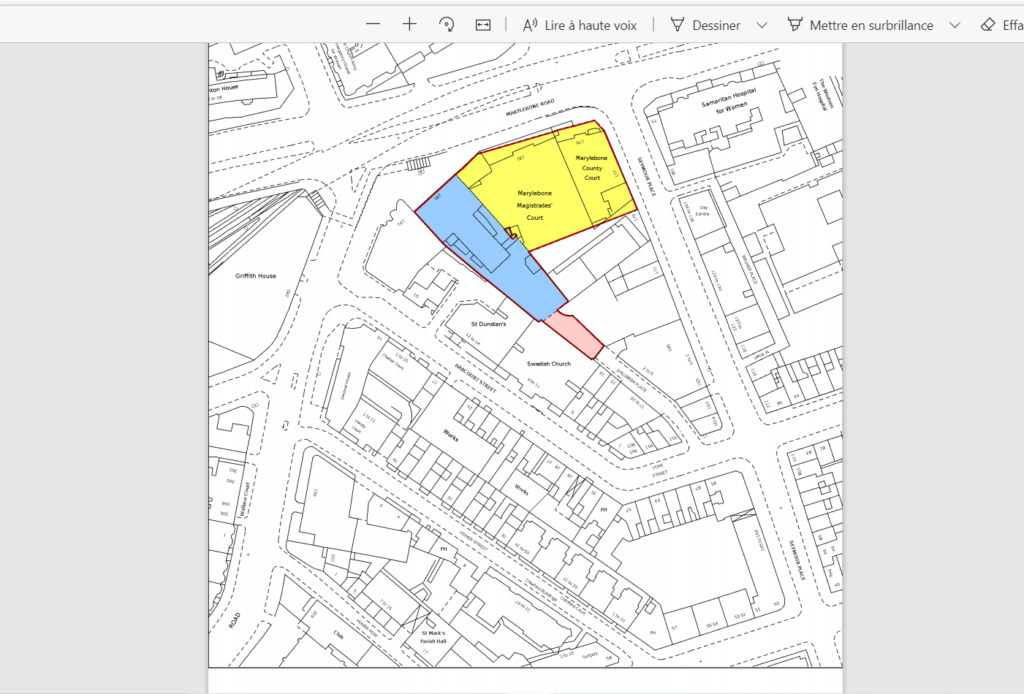
« It belongs to Prudential, doesn’t it? A private company. So a private company can rent rooms for the court but also for any other private event and this is a private event »? The man nods. He actually behaves like one works in the events sector: the private security agents hired by the event organisers secure and filter the private space where the event takes place, while the police, in case of a large crowd, logically manage the public space, the street. It’s sewn with white thread, it’s like being in a film. That’s why there was no covid yesterday when the real Westminster Magistrate’s Court was sitting, which rents its rooms from Prudential according to the land register[1], and that’s why today the covid is used as a pretext to prevent me from entering. The organisers of the event only want Greekemmy, Deepa and Narvez as witnesses. That’s all they want. Besides, Rebecca Vincent in a red coat gets turned away. A little later Elliot and Esther Shipton will try their luck like in the Old Bailey but will not be more successful in the absence of John Shipton, despite two Australian passports in Esther’s hand. They are not useful today for the organizers of the show.
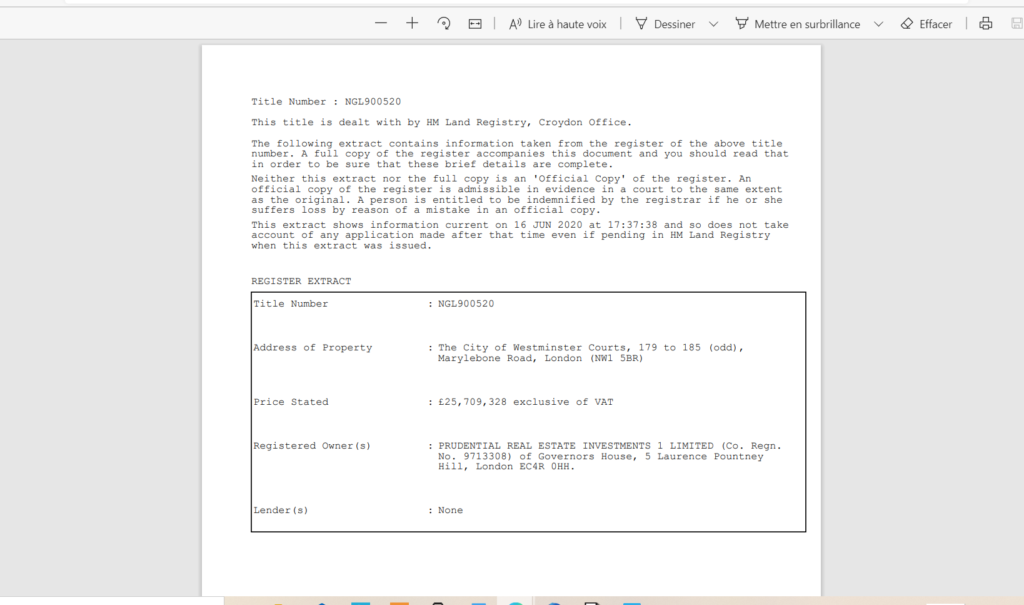
At 10 o’clock there is still no Julian Assange’s « family » and there are still in theory 4 places left. I try again the negotiation. But from behind my back comes Craig Murray, looking lost. « Anushi » allows him to enter the airlock while waiting to have a lawyer on hand to confirm his presence. Of course no one presents any identification, as usual in the Assange case, whose identity is as uncertain as that of his alleged parents, fiancées, wives and children. Suddenly, Craig Murray, stressed out, turns to us to ask… for a pen! The woman behind me gives him his. A journalist without a pen, unfortunately I can’t help him.
Shortly after 10 o’clock the pressure of the journalists on us becomes intense: they photograph Stella Morris approaching the front door. Kristinn Harfnsson and Joseph Farell frame her like two bodyguards. She seems disconcerted and angry at not being able to enter immediately like a star because « Anushi » refuses her like the others. Suddenly there is no more « social distancing » – I find myself side by side with Stella Morris in front of the door, only 30 centimetres between us. I can see her up close, whereas in September at the Old Bailey I certainly noticed her in her red dress chatting happily with Jennifer Robinson in the bays of room 10 before Assange’s arrival on September 9th, but there were still 20 metres between us. Now that I am so close to her, I realize that she is different from the « Stella Morris » who was in Westminster Court on December 19-20, 2019, January 23 and February 19, 2020. Certainly, since the hearing of July 28, 2020, Stella Morris has always worn a big black or red mask that prevents me from distinguishing the bottom of her face. But her height is not deceiving: the woman I saw here from December 2019 to February 2020 and at the Woolwich Court in the last week of February was very small, less than 1.55 cm. This person is at least 1.60 cm tall because the top of her skull is at my eye level and I am 1.67 centimetres tall. She has a more massive face, a more square jaw, thicker lips and her complexion is marked by scars on her right temple that are visible despite the make-up. The woman I met as Stella Morris in the winter of 2019/2020 had a sharper chin, an oval face, a flawless clear complexion with a few freckles. She looked like two sisters, the one in front of me older than the previous one. I am confused, but I also noticed that « Stella Morris » from the previous winter had rounder shoulders and a more opulent chest… She often wore white outfits whereas the Stella Morris after April 11th often wore dark red outfits, today she wears a brown suit and a burgundy turtleneck jumper. I saw her for hours at the Woolwich Court. Of course, I didn’t pay much attention to it, as there was no question at the time that she was Assange’s fiancée, but the few stolen photos published here and there still give me evidence that it may not be the same person.
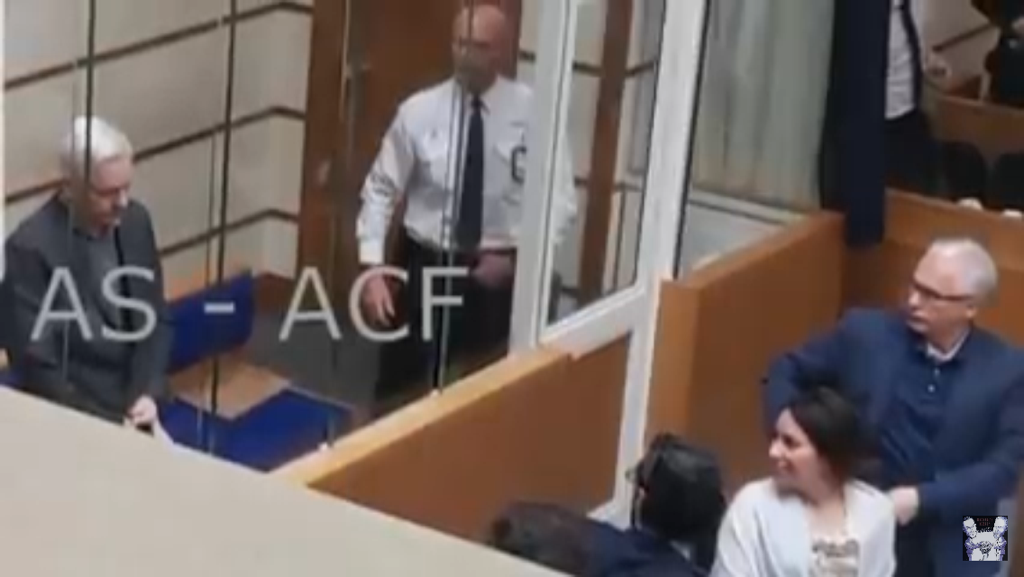
Nor do I forget that Assange did not pay much attention to « Stella Morris » at the Woolwich Court, even if sometimes he slipped her little papers which she was responsible for passing on two rows further on, as at school, to Fitzgerald or Summers.
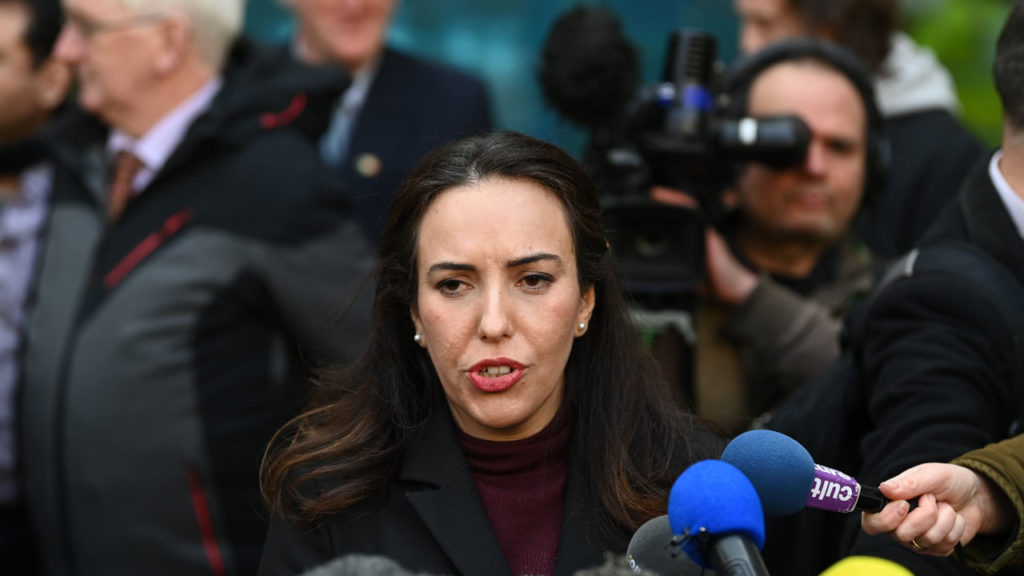
In front of me she looks tough and determined. The « Stella Morris » (or Moris, or Gonzalez Devant, or Smith Robertson…) of the previous winter was not very talkative, refusing to answer any of our questions, she never smiled either, but her impassive face expressed indifference rather than hostility.
During our 10-minute face-to-face, Kristinn Hrafnsson tried to talk to the manager but her voice was barely audible. The trio waits, therefore, machine-gunned by the photographers until a young woman, Florence Iveson or Gareth Peirce’s assistant, wearing a green mask that hides her identity well, discusses with « Anushi » and ends up making them enter by the second door. I see Stella Morris taking off her brown jacket (she doesn’t wear a coat or a bag as usual, as if she had just come out of a nearby flat or had left all her things in a car…) and going through the security gate. I decide to persevere, a place can always become available… But now the male MET policemen are replaced by much less friendly female cops. The female policemen shout dispersal orders to me to the 5 female activists who are still waiting behind me. From what I understand, as in France the police believe that the covid gives them the right to suspend freedom of assembly and movement. According to the « covid measures », we shouldn’t even leave our homes. The policewomen push us towards the wall, they make threats against us. A tall blonde woman targets me, I ask her not to touch me because the covid requires « social distancing » and she is ready to grab me. I duck, I step back, then I come back to the door. The cops push us back towards the journalists’ equipment, as if they were ensuring the safety of an important personality who should not be disturbed. They are much more there for this reason than to keep order on the roads, because we activists are far less numerous than journalists and perfectly peaceful. The tone is rising between some British activists and the police, with the right to freedom of movement and freedom of expression openly clashing with the « new » and illegal world of « covid measures » .
I admit that I will not enter. If Assange is present in room 1, the meeting has begun and will not last long. A little before 10 o’clock photographers had run to the entrance of the Seymour Place in the hope of taking a picture of Assange, but they had come back empty-handed. It is possible that Julian Assange had been brought to this place long before we arrived or by some other means than the entrance of the prisoner vans. I am forced to organise myself in order to act if Julian Assange comes out and gives a speech in front of those dozens of microphones pointed at the door. I have to give him our message on the sign « SOS received » and our contact details. To be politically visible, I have brought a French flag and my Yellow Vest, which I don’t dare to wave but I hold them in my hand. The blonde cop still targets me. I move back to get out of her reach and sit on the floor next to a young journalist who is ready to go on a photo hunt. She is a freelance, I tell her all the events of Wikijustice’s struggle for the liberation of Julian Assange. She is interested and takes our contact details. She has heard about the importance of the Yellow Vests movement coming here in October 2019 and at the Woolwich Court in February 2020 and she is concerned about the political situation in our country, the increasingly violent covid dictatorship. If human rights fall to the countries of Human Rights, it is a very bad sign for the whole world.
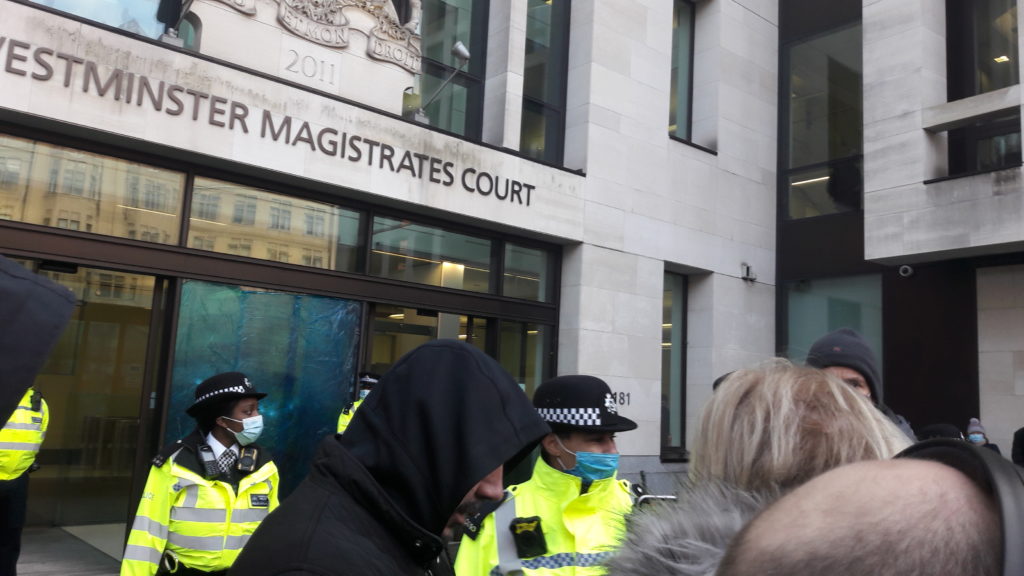
[1] Land Register of the 179 at 185 Marylebone Road – the owner is the compagny Prudential renting rooms to the Westminster Magistrate Court
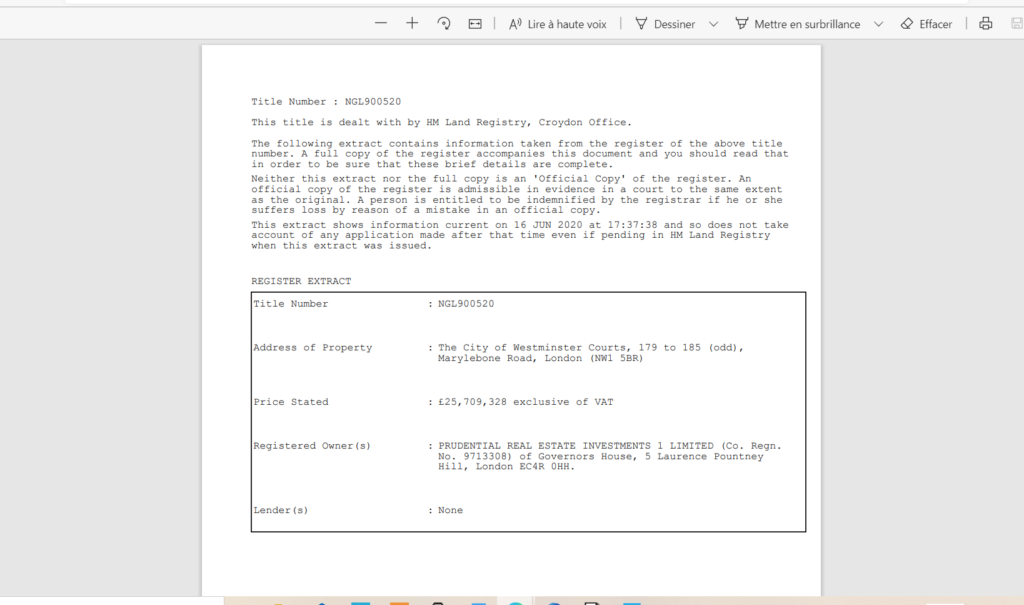
Special police ensuring the protection of personalities?
So we are waiting in the cold under the watchful eye of the cops. At 10.45 am I can see Greekemmy in the glass window on the first floor. She sends messages on her phone. Immediately the activists who had taken refuge behind the journalists to escape from the police start shouting « Free Assange ». I understand that Julian Assange won’t come out. It’s not even worth waiting here any longer. As soon as the refusal of release is pronounced, the captive is usually evacuated quickly. I share my analysis with my neighbour, I stay the time to get confirmation of the bad news and I decide to post myself with my sign, flag and Yellow Vest at the exit of the vans. At least 30 journalists have already done so and they occupy the pavement of Seymour Street place on the left side of the building. But they can’t get close to the carriage entrance because another police force is blocking the access: no less than 6 cars and police buses are parked along the pavement, including a large truck of the MET Territorial Support Group. These policemen all in black look even tougher, but more professional than the women of the MET. They spread out in a cordon in the street, turn the cars around and politely but firmly order us to stay on the opposite pavement. Their uniforms and weapons look worn out, it’s not fake this time. They are real personality protection policemen, exactly like those armed with machine guns guarding Kensington Palace, this Palace so gloomy that one wonders if these policemen don’t keep prisoners inside rather than protecting the palace from the dangers of the outside.
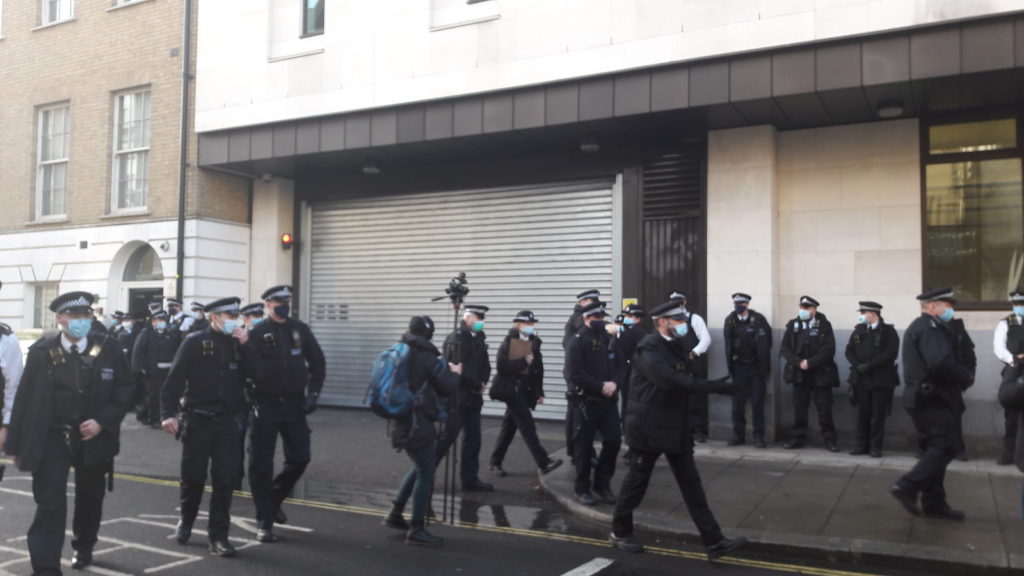
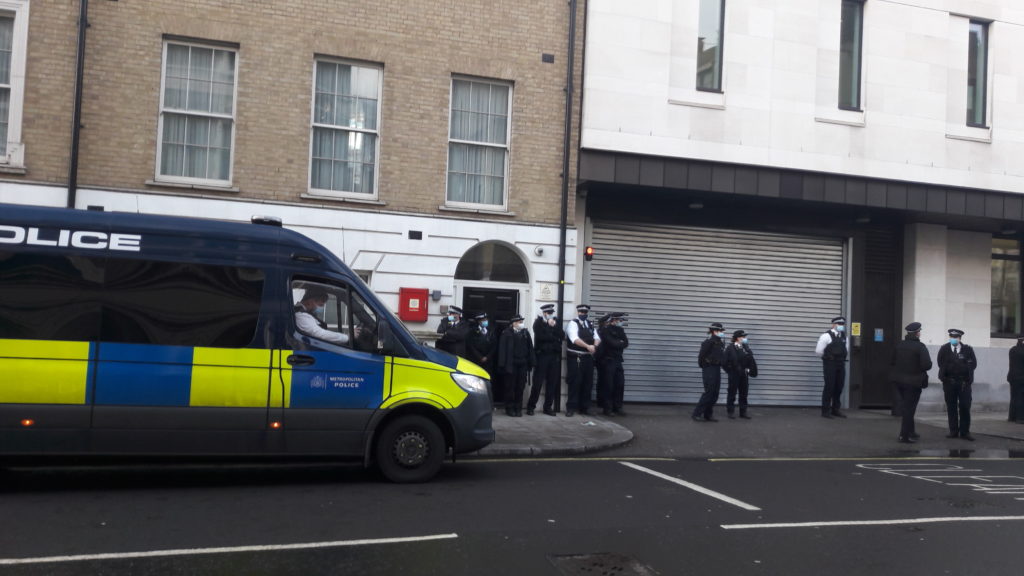
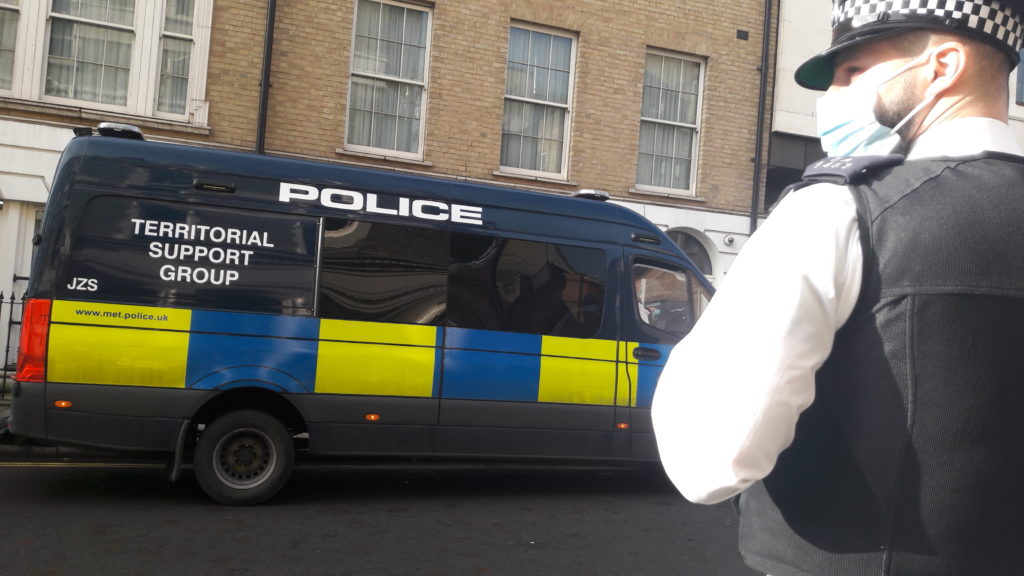
My wait for the vehicle that is supposed to take Assange back to « prison » will last more than two hours. The demonstration continues on Marylebone Avenue, two activists are stopped by the MET police officers who double the cordon of the Territorial Support Group. They were taken to the entrance of the residential building next to the Westminster, possibly a staff accommodation as it belongs to the court complex. The arrested women shout, but it doesn’t sound very bad, a few minutes later I see them joking with the police. Staged or real? I don’t know. The journalists are more and more numerous in this street, losing interest in Stella Morris who makes a short statement in front of an increasingly sparse crowd. On the film that my waiting neighbour will show me, she looks discomfited, she obviously had high expectations that a project that was important to her became a failure.
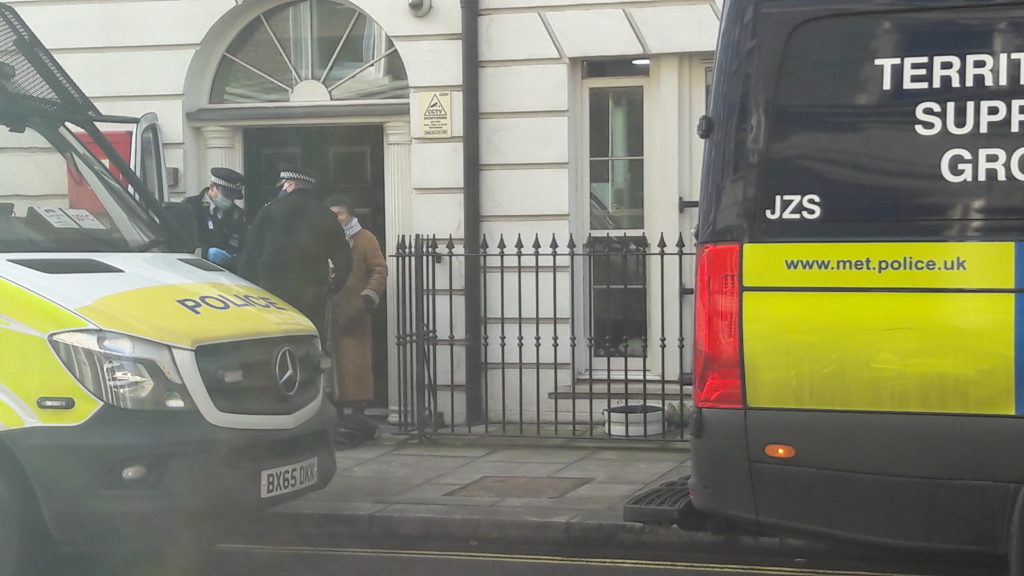
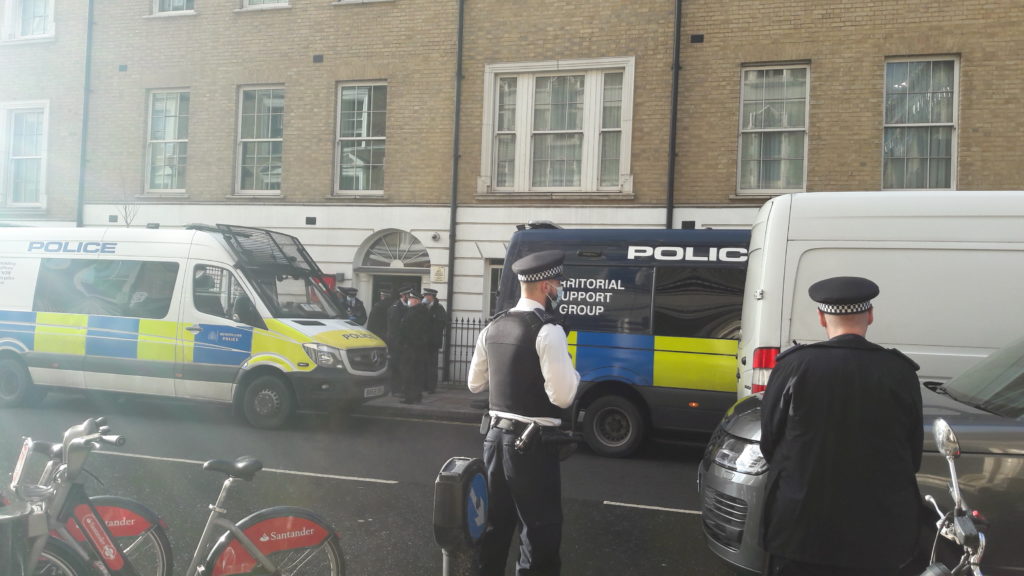
Something is still going on, however, because Assange is still not coming out. Negotiations in high places with important people? The scale of the new police apparatus in these places strongly suggests so. These policemen guarding the Queen did not come to contain us or to enforce the so-called « covid rules ». Yesterday there were no covid rules, no policemen and a crowd in the court. Today the police came to protect those who are negotiating. Indeed no car leaves the Westminster Prudential for 2 hours. I can’t take it anymore as I am so cold and exhausted. In two hours there is only one movement: a small van of the utility type enters the building, the big door rises and in the depths of the Westminster we can see two vehicles, the one on the right parked deeper than the one on the left. The car comes out a few minutes later, without anyone being able to see who is sitting in it, but the journalists don’t move, it is unlikely to be Julian Assange.
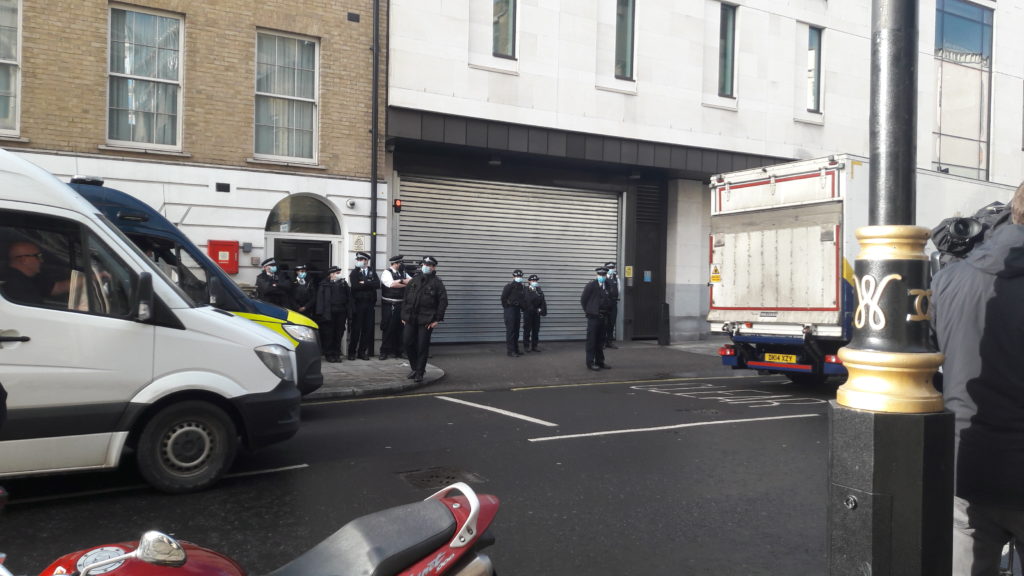
Shortly before 1 p.m. the police officers of the Support Territorial Group leave the place. I see their leader communicating with an officer of the MET who is in charge of the system. She is holding a rigid support with a document placed on it, as if she was scripting a film. When the black van of the real policemen leaves, the cord of policewomen who had nasalized us before moves around the carriage door taking over from the men in black. The Support Territorial Group did not indeed include any women.
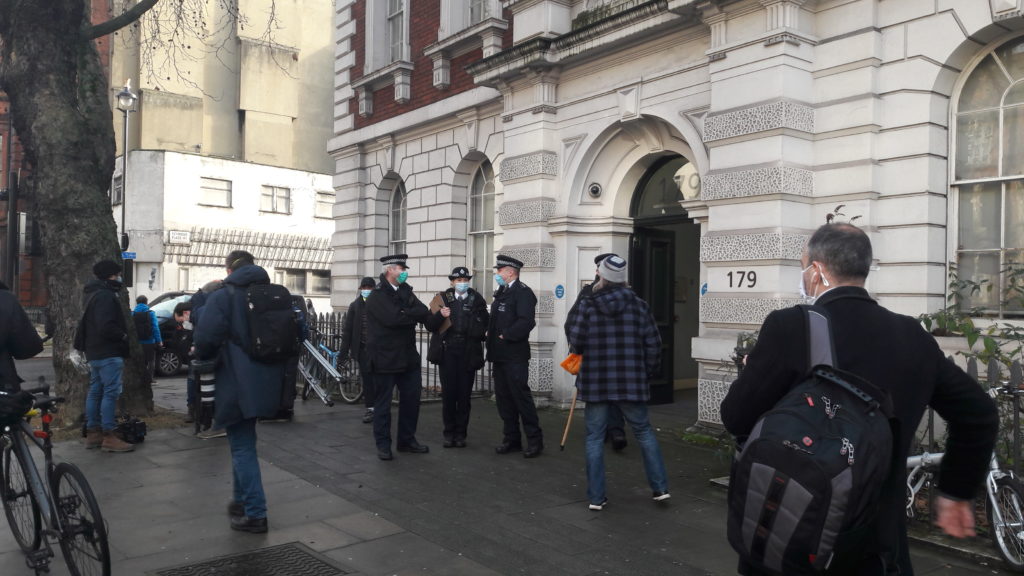
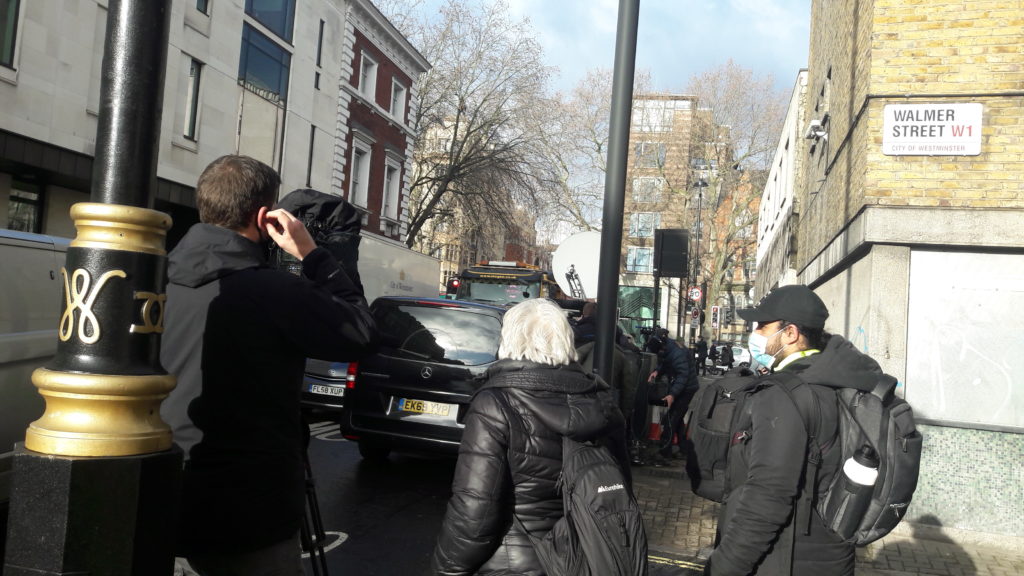
Suddenly at 1.20 pm the carriage gate rises and a prisoner’s van leaves. It is the rush of journalists on the vehicle which turns right towards Marylebone Road. It has two small windows: I also rush out and put my paper on one of them, in the hope that Assange sees our message, as I did here on 20 December 2019 and 13 January 2020. At that time the 5 policemen present were only here, in their own words, to prevent us from entering the basement. But now, as soon as I had the time to make this gesture, the aggressive blonde cop rush on me, grab me and pull me back. She yells in my ear « you broke the covid rules, you’re gonna be arrested« . I’m a foreigner, but I know that English policemen don’t have the right to stop people in the street as easily as in France. There is no national police force in England in fact, but a multitude of local police forces. The MET is only the London City Police, and even the famous Scotland Yard is not a government institution. It cannot control people’s identities and can only act in cases of flagrante delicto or « reasonable suspicion that a crime has been committed »[1]. It is because the government does not have the means to enforce the masking and travel ban obligations that masking is not imposed on the street and that all the ‘covid rules’ are really only ‘recommendations’, unlike the French police and its terror fines.
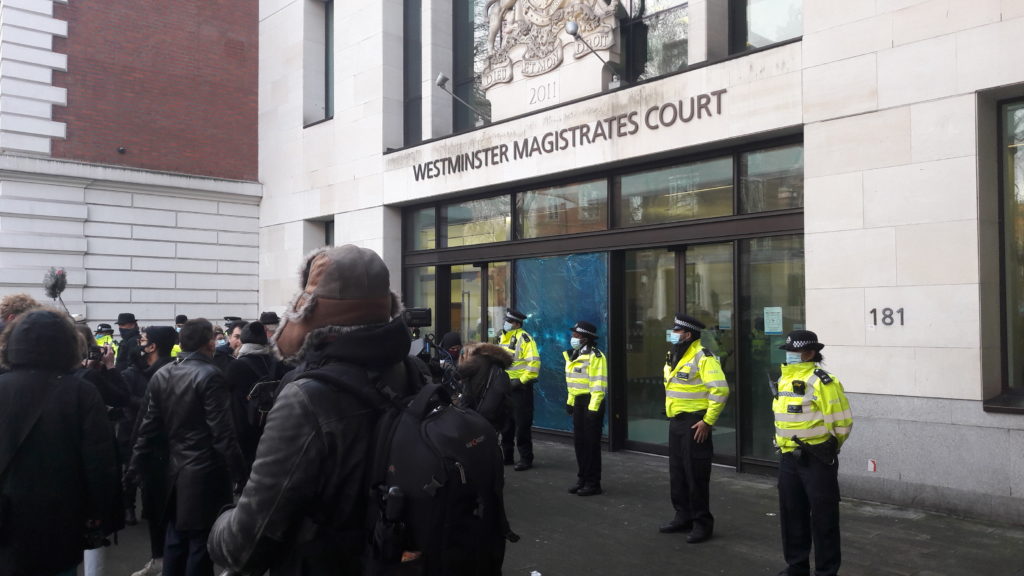
I am shaken by the violence of this person, while another policewoman, more sympathetic, shouts at me « It wasn’t him in the car »! So I come back, I approach them to talk to them. I explain that I haven’t done anything wrong, that I didn’t want to stop the car but to send a message, that Assange is legally free and should have the right to communicate, that it’s not normal for human rights associations to be persona non grata in such a trial, that democracy is in danger... The two other women look at me, I hope they are smiling behind their masks, especially as I’ve taken off mine to show them that I’m not hostile to them. The aggressive blonde continues to grumble about something I don’t understand, still stuck on her ‘covid rules’. Because of the mask, without seeing the expression on the faces, without understanding and being understood, I lose a lot of my diplomatic efficiency.
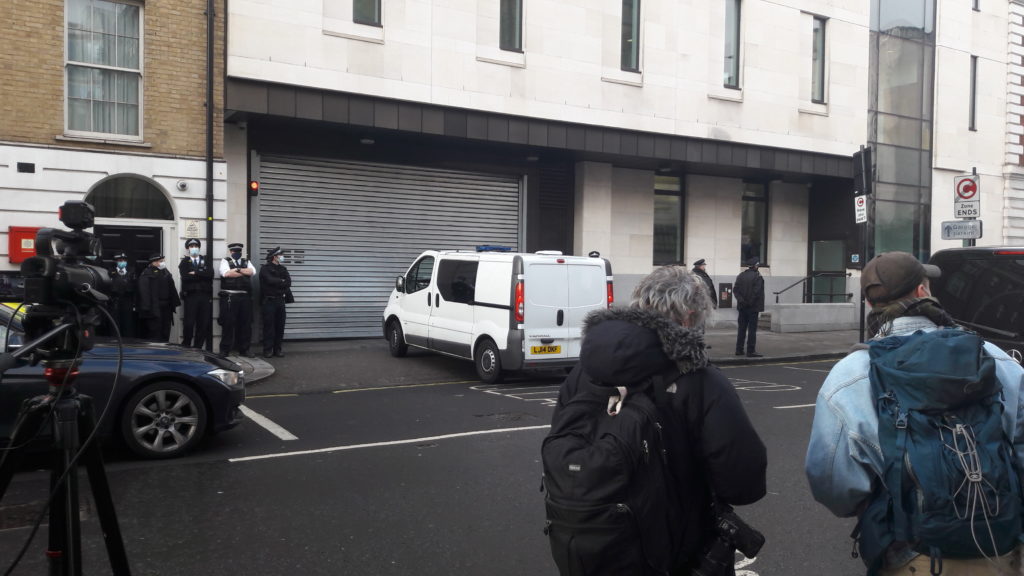
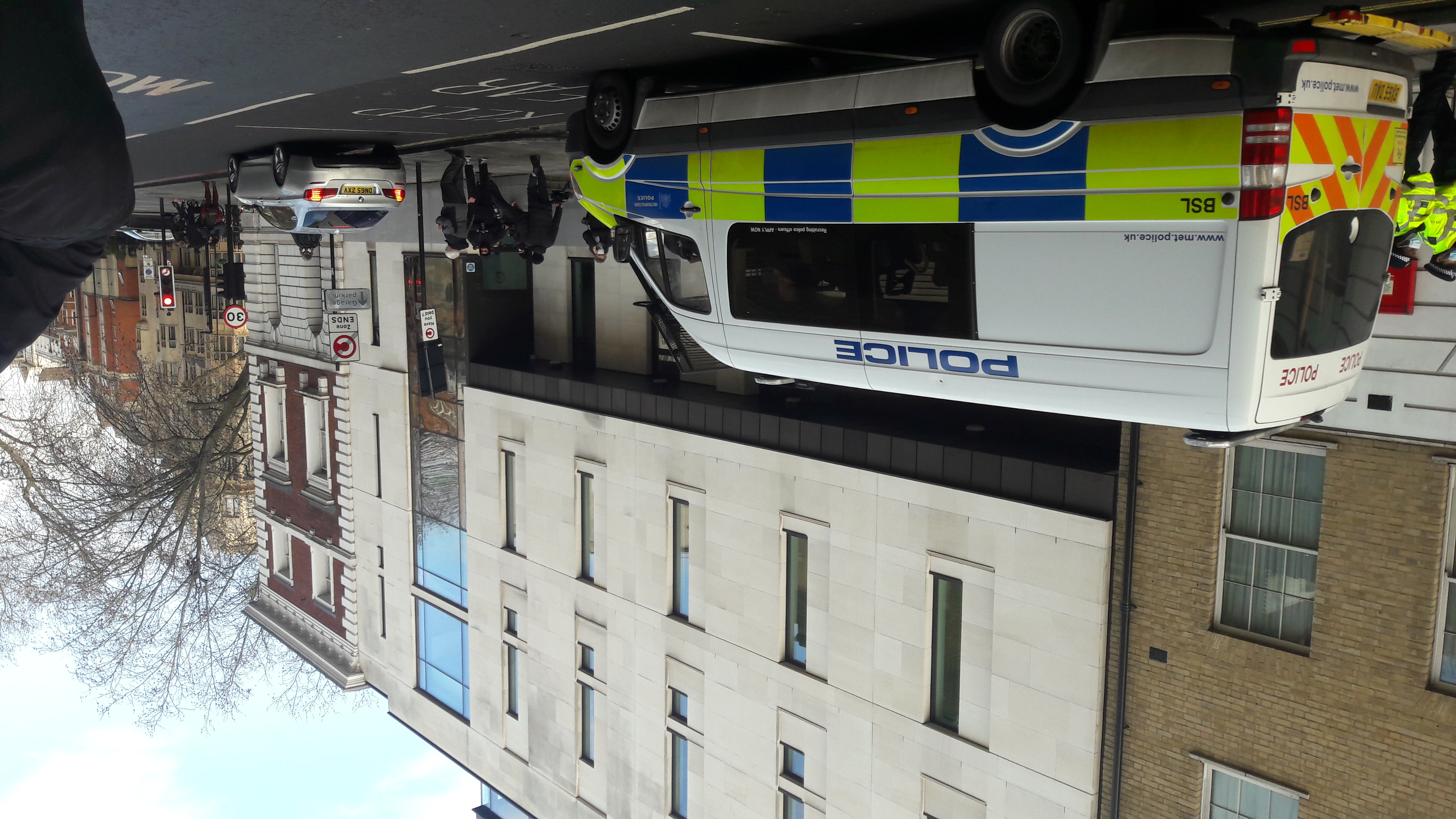
I am forced to walk away under threat, I had already put my French flag and my Yellow Vest back in my bag. I am so fed up with it that I decide to leave, for the first time in my entire militant journey for Assange, without having waited until the end. Behind the block only one small arab café is open: we meet there among militants to finally drink a coffee, some of us manage to convince the owner to warm up inside. It is so inhuman to stand outside in the freezing cold for 8 hours. I take my coffee, come back to the door and sit on the floor as I have been doing in Paris since September, since I no longer have a choice and our lives oscillate between that of tramps and beasts of burden who go to work and return to the stable in the evening under police escort. How can we help Assange when we ourselves must now fight to remain free?
What a spectacular deterioration in the state of human rights in Europe in just one year!
It is finally 1.35 pm when the final act takes place. The door rises, we see all the security agents, including « Anushi », who worked on the event, gathered on the threshold of the garage. They are escorting the large white vehicle was at the far end of the building, which is moving towards the exit. It is not a prisoner’s van, so the journalists do not pay attention to it. Just as the vehicle is about to turn into the street, the private security guards hand over responsibility to the Metropolitan Police, who form a protective cordon around it. So I see that it’s a big white minibus with 30 seats, with no Serco or other prison-related signs. It looks like a government vehicle carrying VIPs. Moreover, it is equipped with a discreet flashing light with a blue light that goes on and off. The windows of the minibus are tinted, as is the passenger door so that it is impossible to see the interior or the driver’s face. It is very likely that Julian Assange is there with important members of staff, negotiators, organisers… chiefs. As the minibus turns left, direction Hyde Park, Kensington, royal quarters, I find myself alone in front of him. I brandish my sign, I raise my fist. If Assange is there, he has seen me.
The minibus starts slowly, then turns right again towards Baywaters and Kensington. The journalists chase him down, they finally figured out that Assange is in it, but it’s too late. The building is empty. The MET policemen put their things in the 2 remaining cars and leave. The door is closed and the security guards leave through the office entrance on the other side. I am so tired and cold that I quickly greet the young freelance journalist and leave to take refuge in my hotel. I didn’t see him, it was impossible, but if he saw me, so I didn’t do all this for nothing.
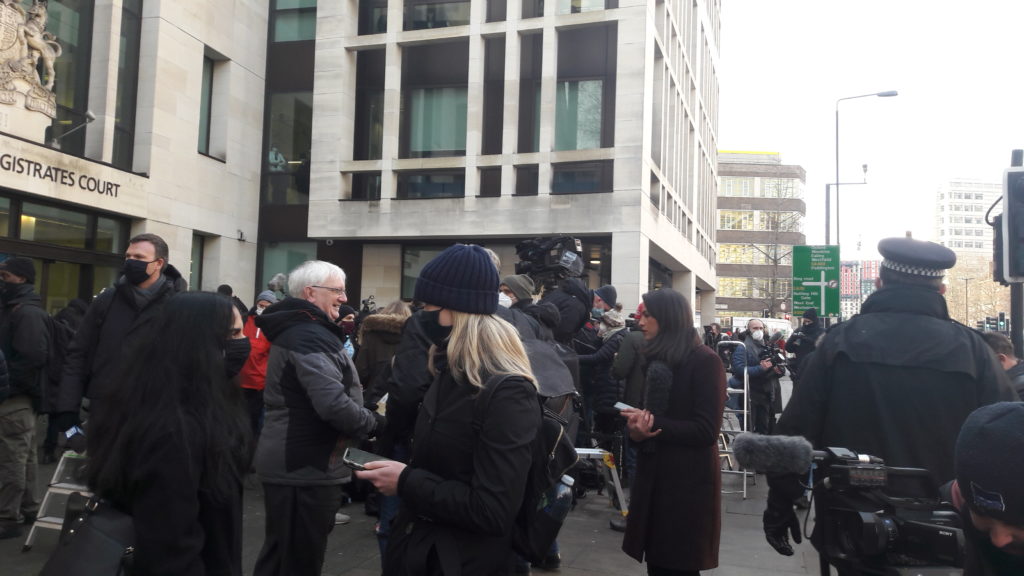
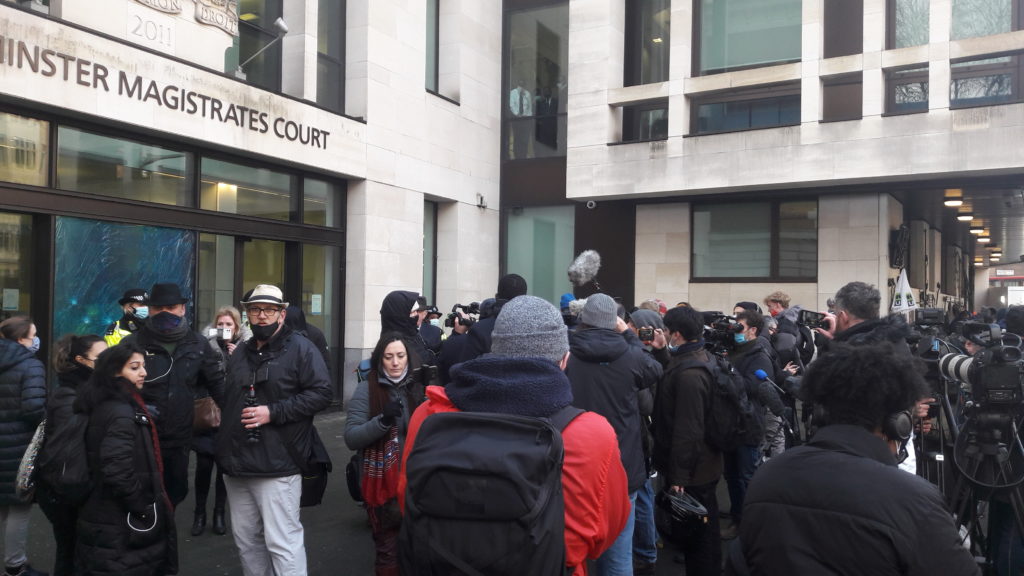
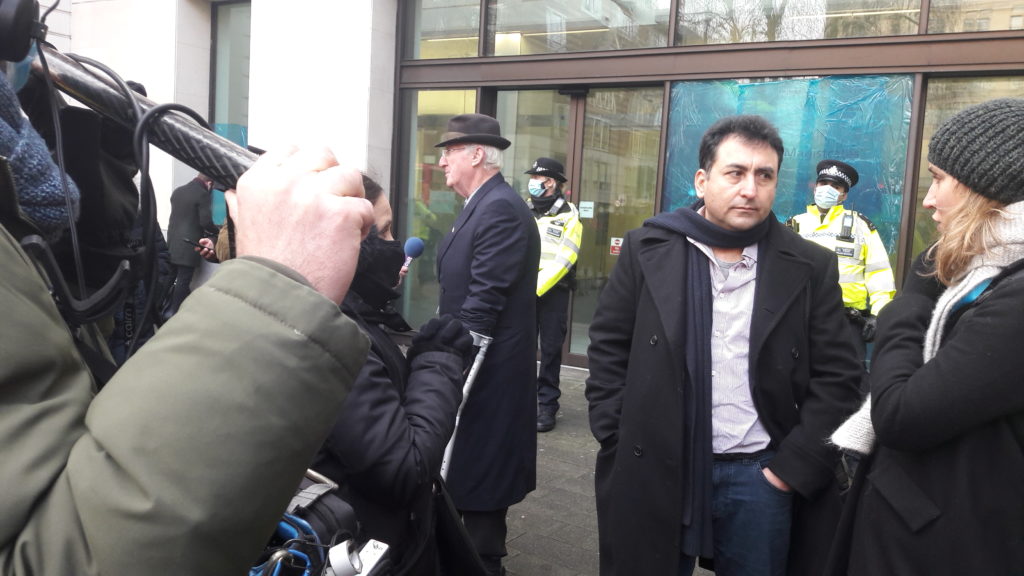
[1] https://www.met.police.uk/advice/advice-and-information/st-s/stop-and-search/your-rights-and-responsibilities/